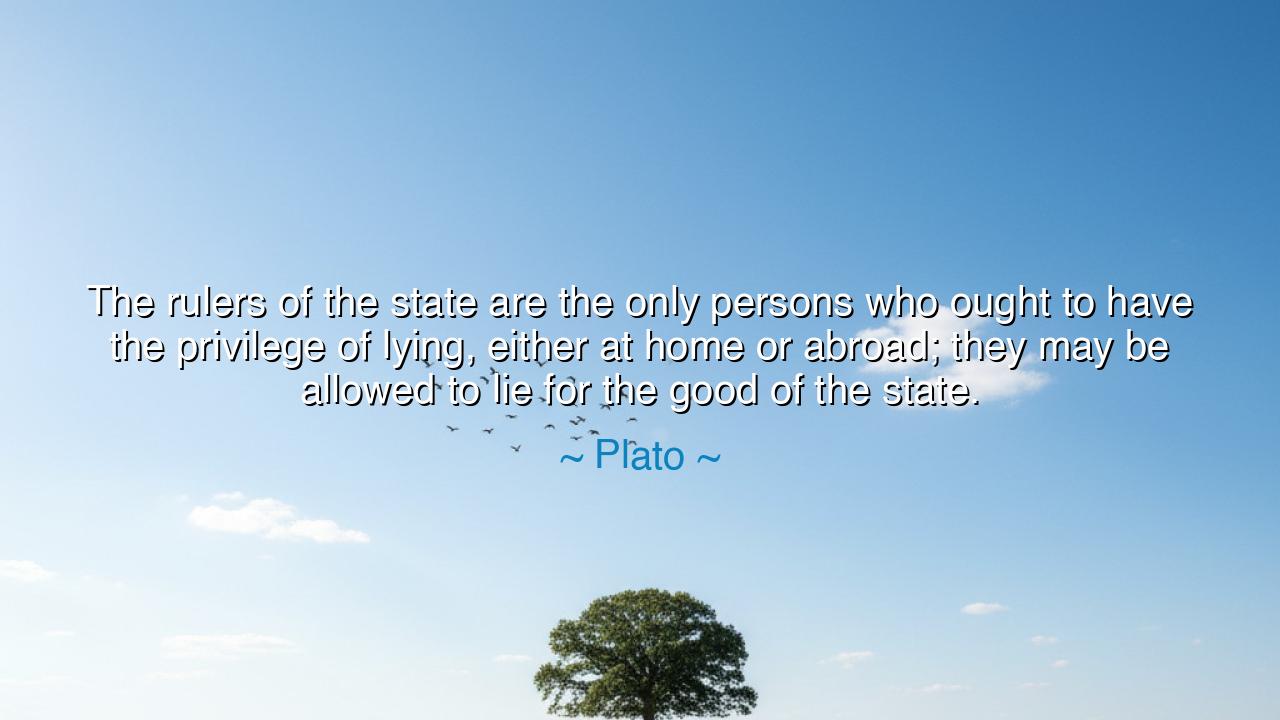
The rulers of the state are the only persons who ought to have
The rulers of the state are the only persons who ought to have the privilege of lying, either at home or abroad; they may be allowed to lie for the good of the state.






The words of Plato, when he declared, “The rulers of the state are the only persons who ought to have the privilege of lying, either at home or abroad; they may be allowed to lie for the good of the state,” arise from the deep and complex wisdom of one who sought to understand both the virtue and necessity of leadership. At first hearing, the saying strikes the heart like iron upon stone — shocking, unsettling, almost heretical. For how could the great philosopher, who prized truth above all, defend falsehood? Yet, as with all teachings of the ancients, these words conceal a mystery, a paradox meant to awaken thought rather than to comfort. Plato speaks not in defense of deceit, but of the burden of rule — the grave and lonely power that demands wisdom beyond the ordinary, where even truth itself may sometimes be a weapon too sharp for the hands of the many.
To grasp the meaning of these words, one must return to Plato’s Republic, that grand vision of a just society governed by philosopher-kings. In this work, Plato sought to craft not merely a city of men, but a reflection of the soul — ordered, disciplined, and guided by reason. He knew that truth is light, but light too bright can blind. The ruler, he said, must sometimes veil truth to preserve harmony, to prevent the chaos that raw knowledge might unleash upon the unprepared. Thus, his “noble lie” — a myth told not for gain, but for the good of all. It is the lie that protects, the fiction that preserves order, much as a parent soothes a frightened child with gentle untruths until the child is ready for the world’s full reality.
But let none mistake Plato’s intention. He did not glorify lies — he feared them. He saw that in the wrong hands, falsehood becomes poison, corroding trust and turning power to tyranny. His permission was not license, but sacrifice: a ruler who lies for the state must do so not for ambition, not for vanity, but out of duty. It is the burden of the shepherd who hides the wolves’ approach from the flock until the time comes to defend them. In this way, Plato’s teaching is not about deception, but about the moral responsibility of power — that the ruler must weigh not only what is true, but what serves the higher good of justice and peace.
History offers many examples of this perilous balance. Consider Winston Churchill, who during the Second World War knew the secret of the German Enigma code but concealed it, allowing some attacks to fall unprevented so that the enemy would not learn the truth. His silence cost lives — yet his lie saved millions. Or think of the generals of old who spread false rumors to shield their cities from despair, preserving morale until victory could be won. Such acts are terrible and sacred, for they walk the knife’s edge between righteousness and ruin. They prove that leadership is not the luxury of purity, but the art of bearing guilt for the sake of the greater good.
Yet the ancients also warned: once rulers believe themselves above truth, corruption follows. The noble lie easily becomes the selfish lie, the falsehood told for gain, the manipulation that feeds pride rather than protects the people. The philosopher-king of Plato’s vision must therefore be bound by wisdom and virtue — for only the one who loves truth above all can be trusted to hide it when necessary. The lie of the just ruler is not born of greed, but of compassion; it is not the lie of the tyrant, but the mercy of the wise.
The lesson for our time is clear. We live in an age where lies multiply like weeds, where rulers too often speak falsehoods not for the good of the state, but for the good of their own ambition. Let us remember Plato’s warning: that truth is sacred, and those who wield it carelessly invite ruin. Power without virtue becomes deception; leadership without conscience becomes tyranny. Only those who seek wisdom selflessly — who tremble before the weight of their decisions — may claim even the smallest right to shape truth for others.
And so, to the rulers of today and the thinkers of tomorrow, this teaching endures: truth is the foundation of justice, but mercy is the shield of the weak. Let not the tongue speak what the heart does not honor. If ever you must veil truth for the sake of peace, do so with humility, not pride — as one who serves, not one who commands. For the gods, and the people, will forgive a lie born of love, but they will never forgive a falsehood born of greed. And in this balance — between truth and compassion, between knowledge and wisdom — lies the eternal art of governance, as old as the soul itself.






AAdministratorAdministrator
Welcome, honored guests. Please leave a comment, we will respond soon